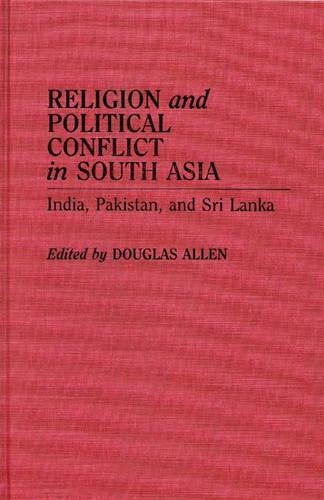
Religion and Political Conflict in South Asia: India, Pakistan, and Sri Lanka
(Hardback)
Publishing Details
Religion and Political Conflict in South Asia: India, Pakistan, and Sri Lanka
By (Author) Douglas Allen
Bloomsbury Publishing PLC
Praeger Publishers Inc
24th August 1992
United States
Classifications
Tertiary Education
Non Fiction
Politics and government
Islam
Buddhism
322
Physical Properties
Hardback
240
Description
One of our most dramatic and surprising developments of the last 20 years was the proliferation of aggressive political movements linked to religion. This book examines the interplay of religion and politics in predominantly Hindu India, Islamic Pakistan, and Buddhist Sri Lanka. This collection of studies by internationally known scholars challenges traditional stereotypes and interpretations of South Asian religion and politics and provides a multidisciplinary perspective on contemporary conflicts. While the focus of the work is on Pakistan, India, and Sri Lanka, the arguments advanced by the authors are useful for understanding recent developments in religion and politics around the world. An informative introduction overviews the link between religion and political conflict in South Asia and offers a framework and synopsis of the chapters that follow. These are grouped into three parts by nationality. The chapters on India examine recent elections and the growth of militant Hinduism, the impact of caste relations on socio-economic conditions, and the problems of Muslims as the largest religious minority in India. The chapters on Pakistan explore how political and economic changes led to the rise of Islamic fundamentalism; the historical relationship among gender, nationalism, and the Islamic state; and the evolution of a capitalist social system in an Islamic nation. The chapters on Sri Lanka explain the role of Buddhist myth in justifying political oppression, the conflict between the ideal of Buddhist pacifism and the reality of political violence, and the impact of race, class, and gender on political conflict. It is intended that political scientists, historians, and religion scholars should find this study a timely and valuable addition to their libraries.
Reviews
The resultant volume is a refreshing, thought provoking analysis of the religious-political situation in South Asia, and an important critique of the standard, often assumed, interpretations. It is an important contribution to the religious, political and social scientific literature about that region. The editor is to be congratulated for successfully completing a coherent volume with so many contributors from so many cultures and situations. It is no mean achievement.-The Christian Librarian
These essays cover a lot of ground and are essential reading for an understanding of the major factors behind contemporary political conflict in South Asia.-Journal of Third World Studies
"These essays cover a lot of ground and are essential reading for an understanding of the major factors behind contemporary political conflict in South Asia."-Journal of Third World Studies
"The resultant volume is a refreshing, thought provoking analysis of the religious-political situation in South Asia, and an important critique of the standard, often assumed, interpretations. It is an important contribution to the religious, political and social scientific literature about that region. The editor is to be congratulated for successfully completing a coherent volume with so many contributors from so many cultures and situations. It is no mean achievement."-The Christian Librarian
Author Bio
DOUGLAS ALLEN is Professor of Philosophy at the University of Maine at Orono. A former Fulbright Instructor at Banaras Hindu University, his interests include Eastern philosophy and religion, Marxism and political philosophy, and the phenomenology of religion. He has authored several books on Mircea Eliade (Structure and Creativity in Religion, Mircea Eliade: An Annotated Bibliography with Dennis Doeing, and Mircea Eliade et le phenomene religieux) and has co-edited, with Ngo Vinh Long, Coming to Terms: Indochina, the United States, and the War.
